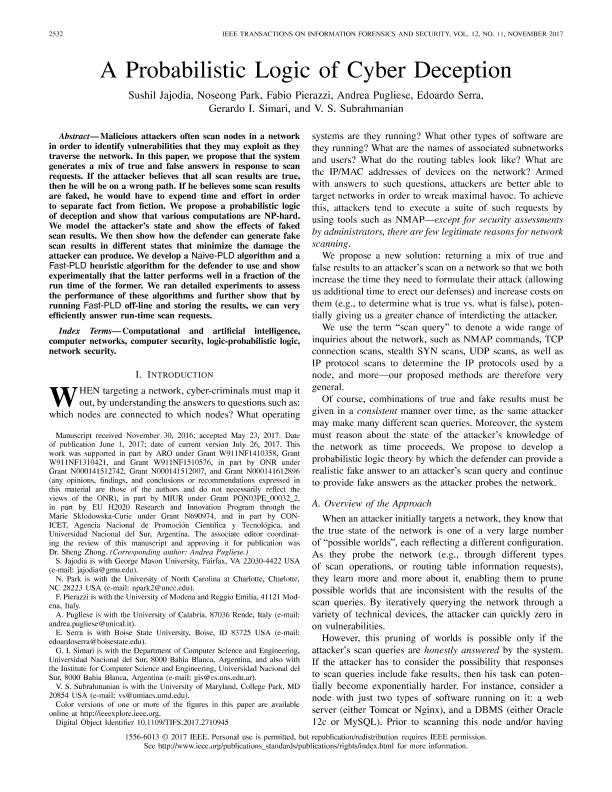Mostrar el registro sencillo del ítem
dc.contributor.author
Sushil Jajodia
dc.contributor.author
Park, Noseong
dc.contributor.author
Pierazzi, Fabio
dc.contributor.author
Pugliese, Andrea

dc.contributor.author
Serra, Edoardo
dc.contributor.author
Simari, Gerardo

dc.contributor.author
Subrahmanian, V. S.
dc.date.available
2018-12-17T20:16:58Z
dc.date.issued
2017-11
dc.identifier.citation
Sushil Jajodia; Park, Noseong; Pierazzi, Fabio; Pugliese, Andrea; Serra, Edoardo; et al.; A Probabilistic Logic of Cyber Deception; Institute of Electrical and Electronics Engineers; Ieee Transactions On Information Forensics And Security; 12; 11; 11-2017; 2532-2544
dc.identifier.issn
1556-6013
dc.identifier.uri
http://hdl.handle.net/11336/66622
dc.description.abstract
Malicious attackers often scan nodes in a network in order to identify vulnerabilities that they may exploit as they traverse the network. In this paper, we propose that the system generates a mix of true and false answers in response to scan requests. If the attacker believes that all scan results are true, then he will be on a wrong path. If he believes some scan results are faked, he would have to expend time and effort in order to separate fact from fiction. We propose a probabilistic logic of deception and show that various computations are NP-hard. We model the attacker's state and show the effects of faked scan results. We then show how the defender can generate fake scan results in different states that minimize the damage the attacker can produce. We develop a Naive-PLD algorithm and a Fast-PLD heuristic algorithm for the defender to use and show experimentally that the latter performs well in a fraction of the run time of the former. We ran detailed experiments to assess the performance of these algorithms and further show that by running Fast-PLD off-line and storing the results, we can very efficiently answer run-time scan requests.
dc.format
application/pdf
dc.language.iso
eng
dc.publisher
Institute of Electrical and Electronics Engineers

dc.rights
info:eu-repo/semantics/openAccess
dc.rights.uri
https://creativecommons.org/licenses/by-nc-sa/2.5/ar/
dc.subject
Computational And Artificial Intelligence
dc.subject
Computer Networks
dc.subject
Computer Security
dc.subject
Logic-Probabilistic Logic
dc.subject
Network Security
dc.subject.classification
Ciencias de la Computación

dc.subject.classification
Ciencias de la Computación e Información

dc.subject.classification
CIENCIAS NATURALES Y EXACTAS

dc.title
A Probabilistic Logic of Cyber Deception
dc.type
info:eu-repo/semantics/article
dc.type
info:ar-repo/semantics/artículo
dc.type
info:eu-repo/semantics/publishedVersion
dc.date.updated
2018-10-29T17:01:09Z
dc.journal.volume
12
dc.journal.number
11
dc.journal.pagination
2532-2544
dc.journal.pais
Estados Unidos

dc.journal.ciudad
Nueva York
dc.description.fil
Fil: Sushil Jajodia. George Mason University; Estados Unidos
dc.description.fil
Fil: Park, Noseong. University of North Carolina; Estados Unidos
dc.description.fil
Fil: Pierazzi, Fabio. Università degli Studi di Modena e Reggio Emilia; Italia
dc.description.fil
Fil: Pugliese, Andrea. Università della Calabria; Italia
dc.description.fil
Fil: Serra, Edoardo. Boise State University; Estados Unidos
dc.description.fil
Fil: Simari, Gerardo. Consejo Nacional de Investigaciones Científicas y Técnicas. Centro Científico Tecnológico Conicet - Bahía Blanca; Argentina. Universidad Nacional del Sur. Departamento de Ciencias e Ingeniería de la Computación. Instituto de Ciencias e Ingeniería de la Computación; Argentina
dc.description.fil
Fil: Subrahmanian, V. S.. University of Maryland; Estados Unidos
dc.journal.title
Ieee Transactions On Information Forensics And Security

dc.relation.alternativeid
info:eu-repo/semantics/altIdentifier/url/http://ieeexplore.ieee.org/document/7937934/
dc.relation.alternativeid
info:eu-repo/semantics/altIdentifier/doi/http://dx.doi.org/10.1109/TIFS.2017.2710945
Archivos asociados
